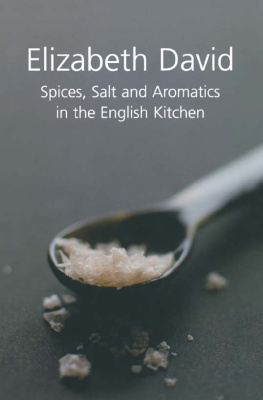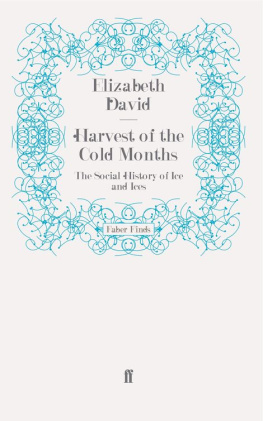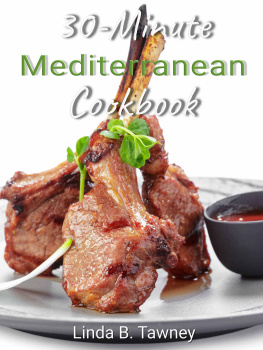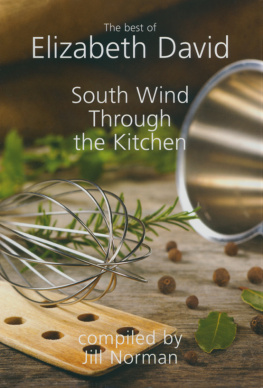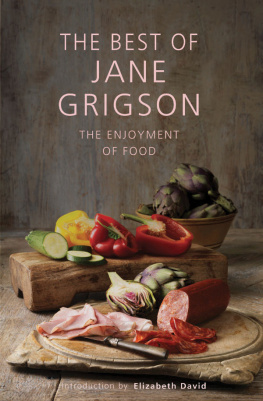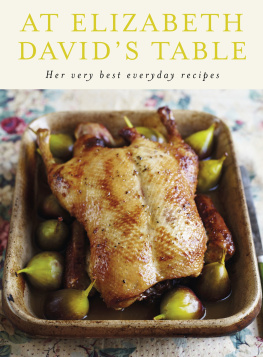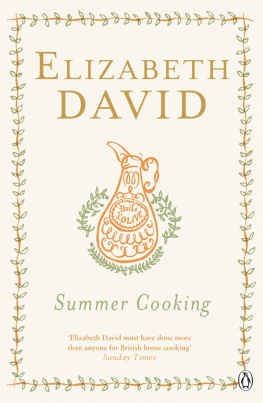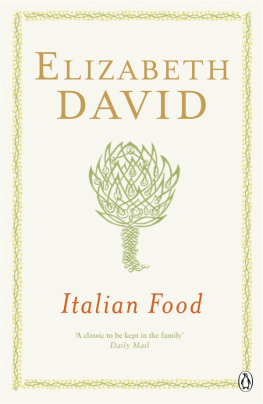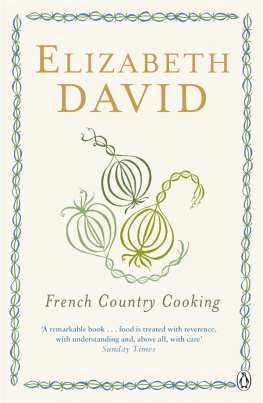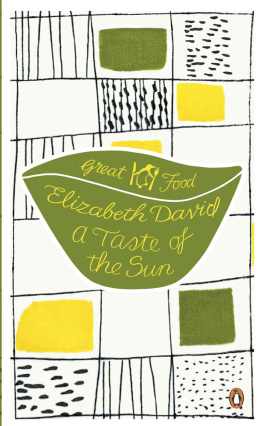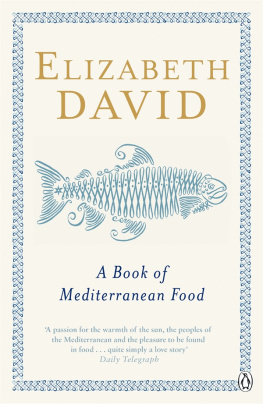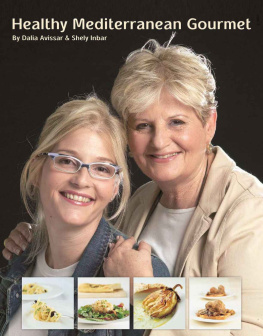Elizabeth David - A Book of Mediterranean Food
Here you can read online Elizabeth David - A Book of Mediterranean Food full text of the book (entire story) in english for free. Download pdf and epub, get meaning, cover and reviews about this ebook. year: 1988, publisher: Penguin Group, genre: Home and family. Description of the work, (preface) as well as reviews are available. Best literature library LitArk.com created for fans of good reading and offers a wide selection of genres:
Romance novel
Science fiction
Adventure
Detective
Science
History
Home and family
Prose
Art
Politics
Computer
Non-fiction
Religion
Business
Children
Humor
Choose a favorite category and find really read worthwhile books. Enjoy immersion in the world of imagination, feel the emotions of the characters or learn something new for yourself, make an fascinating discovery.

- Book:A Book of Mediterranean Food
- Author:
- Publisher:Penguin Group
- Genre:
- Year:1988
- Rating:4 / 5
- Favourites:Add to favourites
- Your mark:
- 80
- 1
- 2
- 3
- 4
- 5
A Book of Mediterranean Food: summary, description and annotation
We offer to read an annotation, description, summary or preface (depends on what the author of the book "A Book of Mediterranean Food" wrote himself). If you haven't found the necessary information about the book — write in the comments, we will try to find it.
A Book of Mediterranean Food — read online for free the complete book (whole text) full work
Below is the text of the book, divided by pages. System saving the place of the last page read, allows you to conveniently read the book "A Book of Mediterranean Food" online for free, without having to search again every time where you left off. Put a bookmark, and you can go to the page where you finished reading at any time.
Font size:
Interval:
Bookmark:
PENGUIN BOOKS
A BOOK OF MEDITERRANEAN FOOD
Elizabeth David discovered her taste for good food and wine when she lived with a French family while studying history and literature at the Sorbonne. A few years after her return to England she made up her mind to learn to cook so that she could reproduce for herself and her friends some of the food that she had come to appreciate in France. Subsequently, Mrs David lived and kept house in France, Italy, Greece, Egypt and India, as well as in England. She found not only the practical side but also the literature of cookery of absorbing interest and studied it throughout her life.
Her first book, Mediterranean Food, appeared in 1950. French Country Cooking followed in 1951, Italian Food, after a year of research in Italy, in 1954, Summer Cooking in 1955 and French Provincial Cooking in 1960. These books and a stream of often provocative articles in magazines and newspapers changed the outlook of English cooks for ever.
In her later works she explored the traditions of English cooking (Spices, Salt and Aromatics in the English Kitchen, 1970) and with English Bread and Yeast Cookery (1977) became the champion of a long overdue movement for good bread. An Omelette and a Glass of Wine (1984) is a selection of articles first written for the Spectator, Vogue, Nova and a range of other journals. The posthumously published Harvest of the Cold Months (1994) is a fascinating historical account of aspects of food preservation, the worldwide ice trade and the early days of refrigeration. South Wind Through the Kitchen, an anthology of recipes and articles from Mrs Davids nine books, selected by her family and friends, and by the chefs and writers she inspired, was published in 1997, and acts as a reminder of what made Elizabeth David one of the most influential and loved of English food writers. A final anthology of unpublished recipes, uncollected articles and essays entitled Is There a Nutmeg in the House? is also available in Penguin.
In 1973 her contribution to the gastronomic arts was recognized with the award of the first Andr Simon Memorial Fund Book Award. An OBE followed in 1976, and in 1977 she was made a chevalier de lordre du Mrite Agricole. In the same year English Bread and Yeast Cookery won Elizabeth David the Glenfiddich Writer of the Year Award. The universities of Essex and Bristol conferred honorary doctorates on her in 1979 and 1988 respectively. In 1982 she was elected a Fellow of the Royal Society of Literature and in 1986 was awarded a CBE. Elizabeth David died in 1992.
ELIZABETH DAVID
SECOND REVISED EDITION
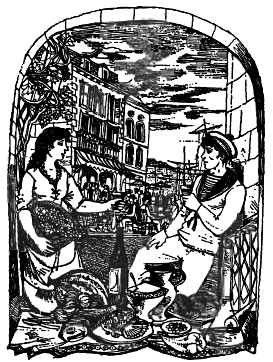
DECORATED BY JOHN MINTON
AND PUBLISHED BY PENGUIN BOOKS
PENGUIN BOOKS
Published by the Penguin Group
Penguin Books Ltd, 80 Strand, London WC2R 0RL, England
Penguin Putnam Inc., 375 Hudson Street, New York, New York 10014, USA
Penguin Books Australia Ltd, 250 Camberwell Road, Camberwell, Victoria 3124, Australia
Penguin Books Canada Ltd, 10 Alcorn Avenue, Toronto, Ontario, Canada M4V 3B2
Penguin Books India (P) Ltd, 11 Community Centre, Panchsheel Park, New Delhi 110 017, India
Penguin Books (NZ) Ltd, Cnr Rosedale and Airborne Roads, Albany, Auckland, New Zealand
Penguin Books (South Africa) (Pty) Ltd, 24 Sturdee Avenue, Rosebank 2196, South Africa
Penguin Books Ltd, Registered Offices: 80 Strand, London WC2R 0RL, England
www.penguin.com
First published by John Lehmann 1950
This edition revised for Macdonald and Co. by Elizabeth David and first published by them in 1958
First revised edition published in Penguin Books 1955
Second revised edition 1965
Reprinted with a new introduction 1991
Copyright Elizabeth David, 1958, 1965, 1988
All rights reserved
An illustrated and revised edition was published by Dorling Kindersley in 1988
Except in the United States of America, this book is sold subject to the condition that it shall not, by way of trade or otherwise, be lent, re-sold, hired out, or otherwise circulated without the publishers prior consent in any form of binding or cover other than that in which it is published and without a similar condition including this condition being imposed on the subsequent purchaser
ISBN: 978-0-14-195649-7
TO
Veronica Nicholson
*
* * * * * * * * * * * * * * * * * * * *
* * * * * * * * * * * * * * * * * * * *
T HE cooking of the Mediterranean shores, endowed with all the natural resources, the colour and flavour of the South, is a blend of tradition and brilliant improvisation. The Latin genius flashes from the kitchen pans.
It is honest cooking, too; none of the sham Grande Cuisine of the International Palace Hotel.
It is not really an exaggeration, wrote Marcel Boulestin, to say that peace and happiness begin, geographically, where garlic is used in cooking. From Gibraltar to the Bosphorus, down the Rhone Valley, through the great seaports of Marseilles, Barcelona, and Genoa, across to Tunis and Alexandria, embracing all the Mediterranean islands, Corsica, Sicily, Sardinia, Crete, the Cyclades, Cyprus (where the Byzantine influence begins to be felt), to the mainland of Greece and the much disputed territories of Syria, the Lebanon, Constantinople, and Smyrna, stretches the influence of Mediterranean cooking, conditioned naturally by variations in climate and soil and the relative industry or indolence of the inhabitants.
The ever recurring elements in the food throughout these countries are the oil, the saffron, the garlic, the pungent local wines; the aromatic perfume of rosemary, wild marjoram and basil drying in the kitchens; the brilliance of the market stalls piled high with pimentos, aubergines, tomatoes, olives, melons, figs, and limes; the great heaps of shiny fish, silver, vermilion, or tiger-striped, and those long needle fish whose bones so mysteriously turn out to be green. There are, too, all manner of unfamiliar cheeses made from sheep or goats milk; the butchers stalls are festooned with every imagineable portion of the inside of every edible animal (anyone who has lived for long in Greece will be familiar with the sound of air gruesomely whistling through sheeps lungs frying in oil).
There are endless varieties of currants and raisins, figs from. Smyrna on long strings, dates, almonds, pistachios, and pine kernel nuts, dried melon seeds and sheets of apricot paste which is dissolved in water to make a cooling drink.
All these ingredients make rich and colourful dishes. Over-picturesque, perhaps, for every day; but then who wants to eat the same food every day? I have, therefore, varied this collection with some classic dishes and recipes from regions of France other than those bordering the Mediterranean. I have also devoted a special chapter to dishes which constitute a meal in themselves, such as Palla, Cassoulet, and Pilaffs, and another chapter to cold food, fine dishes which are particularly suitable to our servantless lives; prepared in advance and either preceded or followed by a spicy, aromatic southern dish, what more could one want?
With this selection (it does not claim to be more) of Mediterranean dishes, I hope to give some idea of the lovely cookery of those regions to people who do not already know them, and to stir the memories of those who have eaten this food on its native shores, and who would like sometimes to bring a flavour of those blessed lands of sun and sea and olive trees into their English kitchens.
Next pageFont size:
Interval:
Bookmark:
Similar books «A Book of Mediterranean Food»
Look at similar books to A Book of Mediterranean Food. We have selected literature similar in name and meaning in the hope of providing readers with more options to find new, interesting, not yet read works.
Discussion, reviews of the book A Book of Mediterranean Food and just readers' own opinions. Leave your comments, write what you think about the work, its meaning or the main characters. Specify what exactly you liked and what you didn't like, and why you think so.

